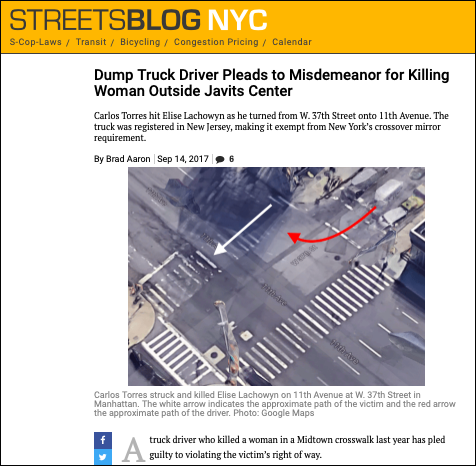A state appeals court has affirmed the legality of the city's "failure to yield" law, rejecting an argument by a killer driver that the law is unconstitutional because it effectively criminalizes a car crash.
In a resounding 3-0 ruling, the First Department of the Appellate Division said that driver Carlos Torres's rights were not violated when police charged him with a misdemeanor under city Administrative Code section 19-190(b), also known as the Right of Way law.
The court's ruling is no small matter — a point the three judges underscored themselves: "This is the first appellate court addressing, on the merits, a constitutional challenge to section 19-190(b)," the decision stated. (Lower courts have similarly ruled.)
The facts in the case are not in dispute: On Feb. 12, 2016, Torres was driving a dump truck on W. 37th Street in Manhattan when he ran over and killed Elise Lachowyn as he turned onto 11th Avenue. Torres, then 51, was charged under the city’s Right of Way Law, but also got a summons for failure to exercise due care, which is a traffic infraction under state law. He pleaded guilty to both charges and was ordered to pay a fine of $750 plus $88 in fees.

But shortly after his guilty plea, Torres had second thoughts, and filed an appeal on the grounds that 19-190 is unconstitutional because it ostensibly criminalizes an act that he did not intend to commit — what the judges summarized as creating a new "civil negligence standard distinct from the traditional categories of criminal mens rea." In short, Torres was arguing that the law can't criminalize "an accident."
He also argued that the city's Right of Way law is illegal because it preempts the state's vehicle and traffic law, section 1146, which punishes drivers with a violation if they fail to exercise due care.
The judges rejected the appeal on both grounds.
Regarding criminal intent, the judges pointed out that prosecutors do not need to show that a driver willfully intended to seize the right of way to prove that a crime has, in fact, been committed.
"The minimum requirement for criminal liability in New York 'is the performance by a person of conduct which includes a voluntary act or the omission to perform an act which he is physically capable of performing,'" the judges wrote, citing state penal law 15.10. "Even strict liability crimes are legal and constitutional. Particularly with regard to public welfare offenses, criminal penalties may be imposed without regard to mental culpability."
And on the second grounds for appeal — that city law can't supersede state law — the judges were even less sympathetic.
"Local laws which do not prohibit what the state law permits nor allow what the state law forbids are not inconsistent," they wrote, citing People v Lewis, 1945. "Here, instead of criminalizing an act that the state law allows, section 19-190 essentially strengthens the criminal penalty for injuring pedestrians and cyclists already authorized by VTL § 1146. A local law which merely provides a greater penalty than state law does not run afoul of the conflict preemption doctrine."
Lawyer Steve Vaccaro, whose practice centers on cyclists and pedestrians who have been injured by drivers, called the decision "huge."
"The pre-emption/constitutionality argument was the prime argument of the opponents of the Right of way law, including some very conservative lawyers and legislators," said Vaccaro, who was not involved in this case. "Trial-level judges [have] refused to enforce it on constitutional grounds. Here, the first appellate court to review the preemption and constitutionality arguments have dismissed those arguments clearly and firmly."
It didn't have to be this way, of course. It has long been illegal to drive recklessly or violate someone else's right of way. But by the 1930s, Vaccaro said, judges began reinterpreting state law to remove punishment for drivers on the grounds that a driver could not be held liable for simple negligence in the way that, say, a crane operator who sets up a faulty apparatus that later falls and kills someone.
"People were doing all sorts of crazy stuff in cars, but the court stepped in and said that laws covering reckless endangerment or manslaughter don't apply to drivers because they don't have that required intent, that mens rea," Vaccaro said. "The judges decided that mere negligence wasn't criminal when it came to drivers. Judges decided that to charge a driver criminally, a DA would need to show an additional violation."
The so-called "rule of two" or the "accidents happen" rule have led to many criminal charges being tossed against reckless drivers — or not being filed at all. But all that has changed, thanks to Monday's ruling, Vaccaro said.
"The legislature has said, 'We're not going to tolerate this kind of driving,' and a court has finally said, 'We agree.'"
In a statement, Manhattan District Attorney Cy Vance — who has had an on-again, off-again relationship with the Right of Way law — said in a statement that he was "proud to defend the constitutionality of New York’s Right of Way Law and secure this significant appellate victory for safer streets.”
Attempts to reach Torres's lawyer were unsuccessful. If Streetsblog reaches the lawyer, we will update this story.






